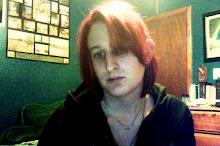Today, though, I want to discuss one particularly problematic entity in Christianity. When I was a kid, pushed through Sunday school, I remember being taught about Original Sin—this idea that because of the whole Garden of Eden incident, we were all marked with sin from the moment of our birth (Adam and Eve were supposed to have transferred their sin to us like some congenital genetic disease—and given that Original Sin is supposed to be common to all people, that’s got to have been one doozy of a genetic disorder, as it has survived for our entire species’ history and has not been selected against by natural selection...oops, there I go trying to apply my science to religion. I forgot that natural selection doesn’t exist, and the world is 4000 years old. Silly me.) Regardless of my long, sarcastic parenthetical, Original Sin is a concept that has become deeply prevalent in our culture, whether we’re aware of it or not: it’s the idea of collective guilt, that there is something inherently wrong with us.
Shame is a big, albeit unspoken, part of our culture. We feel different from others, and wish we were different from ourselves so as to be like others—that way we might belong, fit in, etc. Women are told they cannot be slim enough—must always be thin and feminine. Men are never strong enough. We are never smart enough or sexy enough—never good enough. There’s something defective within us that needs to be fixed; this underlying shame manifests itself in many ways: as doubt, as anorexia/bulimia, neuroses, body dysphoria, as fear or violence, as overachieving or overeating, or addiction, etc. We fight against ourselves or else run away from it—this masked feeling of inadequacy, doubt, fear, and shame. What’s interesting to me is that so many transsexual narratives begin with, “I’ve always know there was something wrong.” Why do we instinctively describe ourselves as wrong. We are wrong.
Think about that for a moment. Take a few minutes and just sit with it: this judgement that we are wrong. Inadequate. Defective. It’s a horrible alienation to subject ourselves to—to reject ourselves so conclusively. Now, what if instead of saying, “I always knew there was something wrong,” we said, “I am [insert gender/identity/affirming word]”? What if instead of describing our bodies as having betrayed us, we welcomed them and welcomed our emotions and our narratives with love and acceptance? How would our lives change if instead of being violent against ourselves, we embraced ourselves?
I’m not saying transition is bad—far from it. Acceptance doesn’t mean you necessarily like something. I didn’t like being gendered as male. I accept, though, that I was. I don’t like my current body—I feel it’s too bulky and too masculine (and getting too fat in places). I’m working on accepting the reality of my body and my own limitations, though I’m struggling with it. A lot. Beneath my feelings of being overly masculine, not feminine, still like a male, different, other, not-whole, fat, ugly, etc.—underneath all this are emotions of fear and shame and doubt. I’ve covered these feelings up with violence, telling myself that I’m, “Not good enough. Not real. Not feminine. Not thin. Lazy. Stupid,” and so on. I alienate myself and fight against my own history, and in a lot of the word choices I see many trans people make, I fear they are doing similar things. Beyond the trans community, though, I know these sorts of destructive coping mechanisms are common in our society, and it’s a thread that goes back to the idea of Original Sin (probably further back from there, too, and made manifest in other forms in other cultures).
What if there’s nothing inherently wrong with you?
I want to befriend myself. I want to show myself love and acceptance—embrace all my aspects as neither inherently good nor bad, or as deficiencies or shortcoming. I want to greet every emotion with respect and welcoming. These typically unwanted emotions are indicative of a part that needs attention. It needs love. I am going to share a poem with you, written by Jelaluddin Rumi:
THE GUEST HOUSE
This being human is a guest house.
Every morning a new arrival.
A joy, a depression, a meanness,
some momentary awareness comes
as an unexpected visitor.
Welcome and entertain them all!
Even if they are a crowd of sorrows,
who violently sweep your house
empty of its furniture,
still, treat each guest honorably.
He may be clearing you out
for some new delight.
The dark thought, the shame, the malice.
meet them at the door laughing and invite them in.
Be grateful for whatever comes.
because each has been sent
as a guide from beyond.
I’m told there’s a picture of the Buddha in which Mara, the god of hate, greed and delusion, attacked with a shower of poison arrows that represent shadow deities. The Buddha was seated in the posture of compassion—one hand on his heart and the other extended to receive the forces of Mara. As the arrows touch the Buddha, they become flowers and float harmlessly to the ground. Jealousy, hate, fear, shame, anger—they were all transformed by the Buddha’s loving and wakeful presence.

